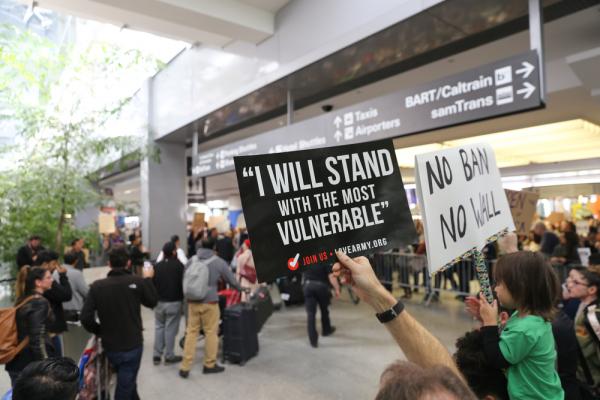Yesterday, in a 5-4 decision, the conservative majority of the Supreme Court upheld the constitutionality of Donald Trump's third attempt to bar Muslims from several nations from entering the United States. Donald Trump's travel ban, which bars entry to the United States for most people from Iran, Libya, Somalia, Syria and Yemen, violates essential religious commitments from many of our faith traditions. How we treat “the stranger” or “the other” is central to our faith and seen as a test of our faith in the Scriptures.
For Christians, Jesus makes clear in Matthew 25 that how we treat “the stranger” is how we treat him. That’s what the Gospel text says. And the “stranger” means immigrants and refugees — the citizens of other nations living and traveling among us. Therefore, this is a faith issue for us as Christians. Donald Trump’s travel ban conflicts with our Christian faith, and we will oppose it as a matter of faith.
Let’s be clear: President Trump’s travel ban is not about security; it is about ideology. His actions and statements since taking office have been completely consistent with his rhetoric on the campaign trail, when he repeatedly vowed to ban all Muslims from entering the United States. The administration's transparent yet now successful attempt to launder a religiously discriminatory policy through a facially neutral proclamation sets an abhorrent precedent that echoes some of the darkest moments of U.S. history.
In a way, it's a cruel joke that the majority used yesterday's decision to officially overturn the Korematsu v. United States decision of 1944 that upheld the government's right to intern Japanese Americans in concentration camps. While this was a welcome and long-overdue step, it's also a way for the conservative majority to attempt to wash its hands, Pilate-like, of the consequences of asserting that current and future presidents have the power to keep members of a disfavored group out of the country if they simply massage the language of their executive orders and proclamations sufficiently. As Justice Sotomayor argued in her dissent, it "merely replaces one gravely wrong decision with another." It's a slippery slope that risks pointing us backwards towards our shameful past, in which the high court long upheld the constitutionality of slavery, Jim Crow laws, the Chinese Exclusion Act, many grievous harms to Native American people and communities, and other horrors, all of which we rightfully recognize today as counter to the principles of the Constitution and the tenets of Christian faith.
This decision is another reminder that human institutions are fallible and only as good as we make them.
This is a political policy, not a rational one. This is a cruel policy aimed primarily at Muslims; not a protective policy for American families. This is a payback policy aimed at satisfying a political base that has become hostile and hateful to Muslims in America and around the world. This is a dangerous policy that has alienated our partners around the world, has been used by our enemies to recruit against us, and is making us less safe.
In addition to being motivated by religious animus, this policy is also aimed at race: The Muslims being banned by this order are primarily people of color; and their targeting is directly related to the white nationalist ideology that has now taken up office in the White House, which is a great danger to America’s future. The use of religion and race for political purposes undermines the United States’ fundamental commitment to being a pluralist and democratic society.
Religious leaders who claim to champion religious freedom cannot be selective about which religion(s) they want freedom for. No religion can truly be freely exercised in our system unless all religions can be freely exercised.
Therefore, we will continue to oppose the administration's travel ban as a matter of faith, and continue our efforts to counter Islamophobia and protect Muslims in America through our Matthew 25 initiative, our work with the Shoulder to Shoulder campaign, and other efforts.
Exercising the right to peacefully assemble, which has already happened in the wake of this shameful Supreme Court decision, will continue to be asked of us many times in the weeks, months, and years ahead on a variety of issues, and we must rise to the occasion, remain engaged, and keep witnessing to our faith and values when they are targeted by this government.
When this administration targets adherents of a religion for second-class citizenship, and has its policy endorsed by the highest court in the land, we must continue to speak truth to power. Religious leaders must speak up against the immoral choices of this president and his administration, as well as those in Congress and the courts who should know better but choose loyalty to a man, a party, or an ideology over the good of the country, the best principles of the Constitution, and true religious liberty for all religions. There is more than politics at stake here; at stake is the soul of our nation and the integrity of our faith.
Got something to say about what you're reading? We value your feedback!





